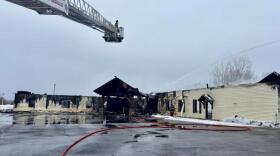Winter is in full force, and as you dig out, you may not be thinking about the toll ice and snow are taking on your power lines. National Grid is giving some advice on how to remove snow and ice safely.
National Grid Communications Manager Jared Paventi said he understands the need to clear snow and ice off of roofs, but he advises double-checking how you’re doing it.
"That weight of that snow and the force of it falling and the ice that might be with it, too, could damage the electric and gas infrastructure that is attached to the home,” Paventi said.
Assume any electric wires are live, and make sure you’re staying at least 10 feet away from overhead power lines. Paventi said it’s also important to keep all ladders, shovels, and rakes away from lines, regardless of their material.
"You can have a wooden ladder, but once it gets wet, water's a conductor, and wet wood can allow electricity to pass through it," he said.
Double check that any exterior electric or natural gas meters are cleared of ice and snow. If you need to clear icicles off of a meter, use a gloved hand. Don’t kick a meter, or try to knock ice off with a shovel.
Damage to natural gas meters can cause a serious safety risk, and Paventi said, if you suspect a gas leak, act fast.
"You'll smell that mercaptan, which is like a rotten egg smell, and we tell people, 'Get Out,’” Paventi said. “If you're in the home, get out of the home. Don't turn on light switches. Don't turn off light switches. Don't make a phone call. Don't open a garage door. Go out a door."
Also, blocked exterior vents, like for furnaces, dryers, or hot water heaters, can lead to a buildup of carbon monoxide. It’s a good idea to make sure those vents are clear and that you have a working carbon monoxide detector in your home.
Use extreme caution if you see a downed power line or wire, and always assume they’re carrying live electricity. Don’t touch anything that is touching a downed line because electricity could pass through to you.
For emergency situations, call 911. You can also reach out to National Grid for help. Its 24-hour gas emergency number is 1-800-892-2345, and to report an outage or downed power lines, call 1-800-867-5222.
For more safety tips, click here.







